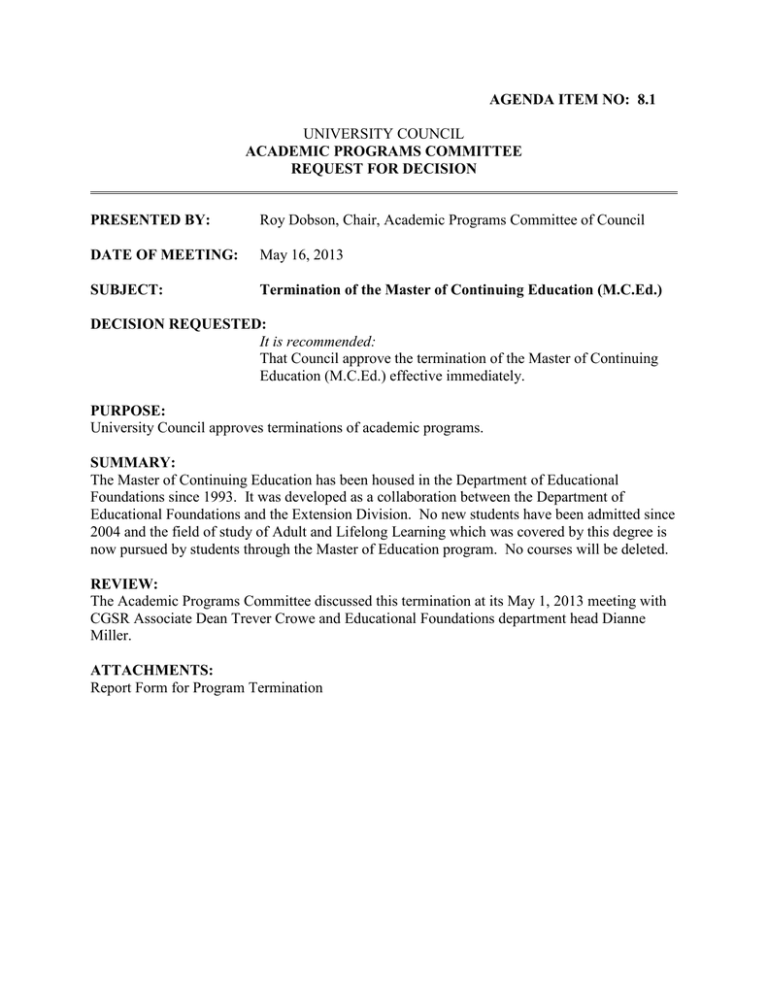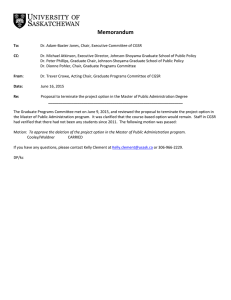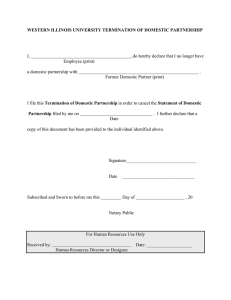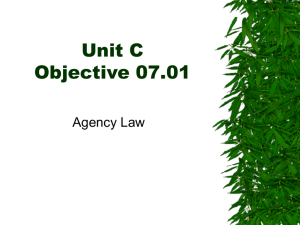UNIVERSITY COUNCIL May 16, 2013 AGENDA ITEM NO: 8.1
advertisement

AGENDA ITEM NO: 8.1 UNIVERSITY COUNCIL ACADEMIC PROGRAMS COMMITTEE REQUEST FOR DECISION PRESENTED BY: Roy Dobson, Chair, Academic Programs Committee of Council DATE OF MEETING: May 16, 2013 SUBJECT: Termination of the Master of Continuing Education (M.C.Ed.) DECISION REQUESTED: It is recommended: That Council approve the termination of the Master of Continuing Education (M.C.Ed.) effective immediately. PURPOSE: University Council approves terminations of academic programs. SUMMARY: The Master of Continuing Education has been housed in the Department of Educational Foundations since 1993. It was developed as a collaboration between the Department of Educational Foundations and the Extension Division. No new students have been admitted since 2004 and the field of study of Adult and Lifelong Learning which was covered by this degree is now pursued by students through the Master of Education program. No courses will be deleted. REVIEW: The Academic Programs Committee discussed this termination at its May 1, 2013 meeting with CGSR Associate Dean Trever Crowe and Educational Foundations department head Dianne Miller. ATTACHMENTS: Report Form for Program Termination Report Form for Program Termination Department: College: Educational Foundations Program(s) to be deleted: Master of Continuing Education Effective date of termination: June 30, 2012 1. List reasons for termination and describe the background leading to this decision. The purpose of the Master of Continuing Education program is to provide a broad‐based critical education based in theories and practices of adult education and lifelong learning to meet the needs of students whose primary interests are in Continuing, Adult, or Extension Education, or Community Development. The program provided for examination of the theories and practices of adult education and lifelong learning; promotion of excellence in scholarly writing in term papers and theses; opportunities to engage in practice‐based research; mentored experiential learning in workplace settings; and provided faculty support of community‐based initiatives and student activism. In the early 2000s, Extension Division collaborated with the Department of Educational Foundations to offer the Master of Continuing Education in both on‐campus and distance format and much preparatory work was done to make this possible. The Systematic Program Review team of 2001 saw the value of the M.C.Ed program, particularly its capacity to attract students across several disciplines e.g., (health sciences, business) and professional colleges (e.g., Medicine, Nursing) and to serve a wider educational community than K‐12. It expressed concern about the program's viability since it was delivered primarily by two senior faculty. It recommended that the department create a plan for program and faculty renewal that would engage the wider university in a collaborative model of delivery. The department joined with Extension Division to develop a blended model of delivery of on‐line and on‐campus courses in the M.C.Ed. Regrettably, the Extension Division was closed and admission to the M.C.Ed halted shortly after the first cohort of students was admitted into this renewed program. With budget cuts, loss of faculty and retirements, no new students have been admitted to the M.C.Ed. since 2004 and the decision was made to discontinue the M.C.Ed after the completion of its last student. a. The department passed a motion to terminate the program August 30, 2011 at its annual retreat (Motion (Marie/Karla) to Discontinue M.C.Ed. Vote with one abstention. CARRIED). In 2012, the College of Education adopted Lifelong learning into its integrated plan and the Department has worked assiduously to retain an Adult and Lifelong Learning focus and was successful in hiring 1.5 positions, one in Leadership in the Professions and Aboriginal Lifelong and Higher Learning. Another position in Adult and Lifelong Learning is slated to begin in 2013. Classes developed for the M.C.Ed have been incorporated into the Integrated M.Ed. and students may choose "Adult and Lifelong Learning" as an area of focus and have access to distance classes through the "Lifelong Cohort," therefore, the current Lifelong Learning cohort makes the M.C.Ed redundant. 2. Technical information. 2.1 Courses offered in the program and faculty resources required for these courses. GSR 960.0; GSR 961.0 if research involves human subjects; GSR 962.0 if research involves animal subjects; EFDT 990 Thesis option: a minimum of 21 cu. with EFDT 994.0 each term Project (non‐thesis option): a minimum of 27 credit units plus EFDT 992.0 each term * ECNT 810.3 Learning for Life: Practice and Theory in Adult Education * ECNT 892.3 Workplace Learning: An Experiential Learning Internship * ECNT 897.3 Research Methods in Continuing Education *electives for thesis: four elective classes in addition to completing the thesis * electives for project: select six electives in addition to completing the project For required electives in the department students may choose from ECNT 830.3, ECNT 872.3, ECNT 875.3,ECNT 878.3, ECNT 880.3, ECNT 882.3, ECNT 891.3, ECNT 885.3, ECNT 890.3, ECNT 898.3, EIND 851.3, EIND 855.3 2.2 Other resources (staff, technology, physical resources, etc) used for this program. Other faculty formerly associated with the program included personnel from the Extension Division of the University of Saskatchewan. Since the Extension Division was terminated, the faculty have no longer been associated with the program. The only staff person associated with the department was the clerk/secretary of the Department of Educational Foundations. Since the de facto termination of admissions to the program, the secretary has continued to work in the department engaged in other regular administrative support for the department and other Department graduate programs including for the Educational Foundations Master of Education program and four special case PhD students. There are no other staff, technology, physical resources or other resources used for this program. 2.3 Courses to be deleted, if any. No courses are to be deleted. 2.4 Number of students presently enrolled. No students are currently enrolled. 2.5 Number of students enrolled and graduated over the last five years: 15 3. Impact of the termination. Internal 3.1 What if any impact will this termination have on undergraduate and graduate students? There will be no impact as there are no students in the program and there is no relationship between this program and any undergraduate program or other graduate program on campus. How will they be advised to complete their programs? No advising is required since there are no students in the program. 3.2 What impact will this termination have on faculty and teaching assignments? There will be no impact on teaching assignments. Since the program ceased to accept students professors Dr. Michael Collins, Dr. Reg Wickett and Dr. Bob Carlson of this department and formerly associated with the program are retired from the faculty so they are not affected by the change. 3.3 Will this termination affect other programs, departments or colleges? No, this termination will not affect other programs, colleges or departments. There is no formal relationship between this program and other programs in the Department of Educational Foundations, with other departments, within the College of Education and with other colleges. Courses taught in the M.C.Ed program are also taught in the Educational Foundations Master of Education program. But the courses are not being deleted so the termination will not affect the other programs. 3.4 If courses are also to be deleted, will these deletions affect any other programs? No courses will be deleted. Courses will be available to be used in the EFDT Master of Education program which they also served. These courses have been used in particular to support the Lifelong and Adult Education focus of the Educational Foundations Master of Education program; and they are included in “cohort” offerings which focus on the lifelong and adult education. 3.5 Is it likely, or appropriate, that another department or college will develop a program to replace this one? No, it is not likely that another department or college to develop a program to replace this one. The Department of Educational Foundations has been uniquely situated in the university to offer this program; and there is no other department with a similar resources faculty and mandate to offer this program. The current Lifelong Learning cohort makes the M.C.Ed redundant. 3.6 Is it likely, or appropriate, that another department or college will develop courses to replace the ones deleted? No courses are being deleted, therefore, it is not likely or appropriate that another department will develop courses to replace them. The courses will continue to be used in the Educational Foundations MEd. 3.7 Describe any impact on research projects. There is no impact on research projects. Professors associated with this degree offering are now retired. 3.8 Will this deletion affect resource areas such as library resources, physical facilities, and information technology? No 3.9 Describe the budgetary implications of this deletion. There are no budgetary implications. The admissions to the program were terminated several years ago (2005) so there is no revenue from student or other sources for the program, and the faculty employed to offer the program have retired from the university. External 3.10 Describe any external impact (e.g. university reputation, accreditation, other institutions, high schools, community organizations, professional bodies). There will be no impact on other institutions. 3.11 Is it likely or appropriate that another educational institution will offer this program if it is deleted at the University of Saskatchewan? No it is not likely that it will be taken up by another institution. I don’t know if is it appropriate. That would require market surveys and assessment of capacity. Other 3.12 Are there any other relevant impacts or considerations? None. 3.13 Please provide any statements or opinions received about this termination. None. (Optional) 4. Additional information. Programs which have not undergone recent formal reviews should provide additional relevant information about quality, demand, efficiency, unique features, and relevance to the province. This program did not undergo review in the recently completed Graduate Program Review because admissions had been terminated some time before and the because the department voted the program be terminated at its fall retreat in fall of 2011. 5. Attachments. Please attach memos from the Department and College regarding this termination. There are no memos associated regarding this termination. College of Graduate Studies and Research MEMORANDUM To: Cathie Fornssler, Committee Coordinator Academic Programs Committee of University Council From: Trever Crowe, Associate Dean College of Graduate Studies and Research Copies: D. Miller, L. Hellsten, L. McIntyre Date: April 8, 2013 Re: Proposal to delete the Master of Continuing Education housed in the Department of Educational Foundations Consistent with the Curricular Changes – Authority for Approval chart approved by University Council April 2002, attached is a report that describes the review of the proposed deletion of the Master of Continuing Education housed in the Department of Educational Foundations. This report includes three appendices: CGSR committees’ recommendations for approval, correspondence associated with the review process (most recent to earliest), and the CGSR approved proposal. The formal review started with the Graduate Programs Committee on June 13, 2012 and the final motion to recommend to the Academic Programs Committee was made by the College Executive Committee on September 20, 2012. As communicated to CGSR March 12, 2013, the College of Education Graduate Committee met November 5, 2012, and at that time supported the proposed deletion of the Master of Continuing Education degree. The College of Graduate Studies and Research supports the deletion of the Master of Continuing Education. If questions or concerns arise during the review by the Academic Programs Committee, I would be happy to respond. TC/ab [Appendices available on request to the Office of the University Secretary]


